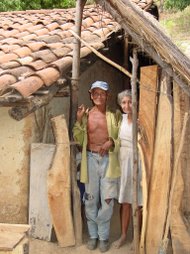It did not take me long to get frustrated with what I see in the clinic and the medical brigade in Duyure. There are so many people with so little! The campesinos come into the clinic with problems that would be avoided by bathing semi-regularly, and are hungry because they have too many children. The average agricultural worker (typical Honduran) makes two and a half to three an a half dollars a day. To put that in perspective, I have over seven dollars per day to feed myself and I often run out before the week ends!
So, I am really only involved with the medical portion of the mission. In rural Honduras, it is the custom for women to bear children as often as they can, and men in their sixties and seventies routinely sire little babies. These people, in the rural areas, generally cannot feed or care for their children because they are so poor. One girl came with her father who was two years old and had maybe never bathed in her life. She had a worm in her head and Dr. Javier would not cut it out because she was too dirty to safely operate on her. We gave her a bath and told her father to bathe her every day for the next five days, and then bring her back for her surgery. We didn't see her again.
We give food to these people every week, which initially frustrated me because it allows them to have more babies, so that a house of twelve that was already starving becomes a house of thirteen that is starving even more! This is ridiculous! It took me a while to realize that Mission Lazarus is working on the population problem too, in an indirect way. Not only do we feed and medicate the poor, we also educate the children and teach the adults better farming practices. The children will grow up with a better understanding of cause and effect and more options to explore than the tradition of marrying young and having dozens of children (I exaggerate not). Also, the farmers will have more to feed their families with because of the work of the agricultural department of the mission, which includes education about drip irrigation and rotating crops so as not to desertify the land.
As far as my own thoughts, I have really come to believe in what Mission Lazarus is doing. Instead of just changing one aspect of life for the poor in Honduras, they are helping to change their entire lives so that fewer children starve and more grow up to have multiple viable options, like vocational school or college as well as the more traditional life of agriculture and staying close to family.
Pab
Wednesday, July 11, 2007
Subscribe to:
Post Comments (Atom)

No comments:
Post a Comment